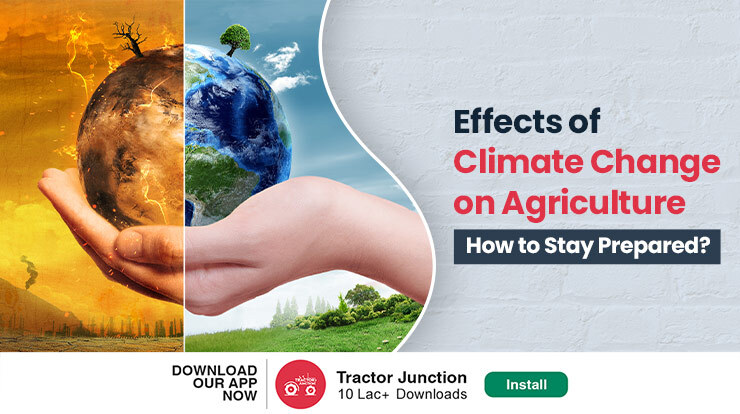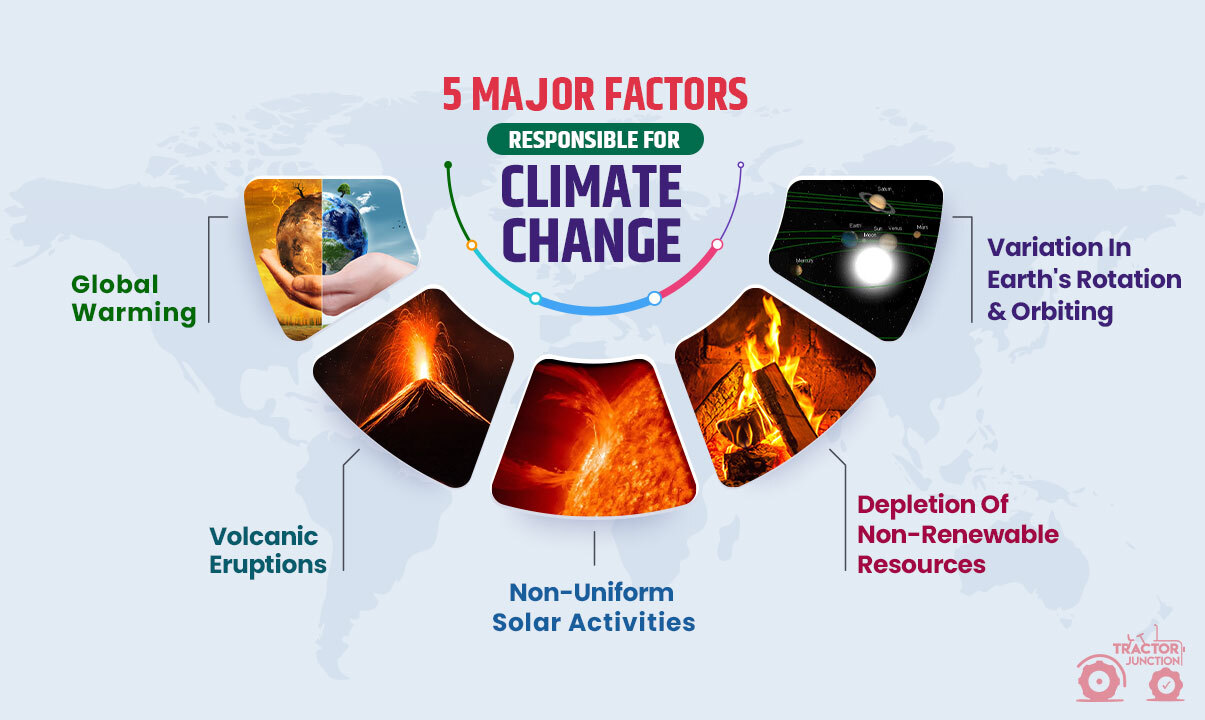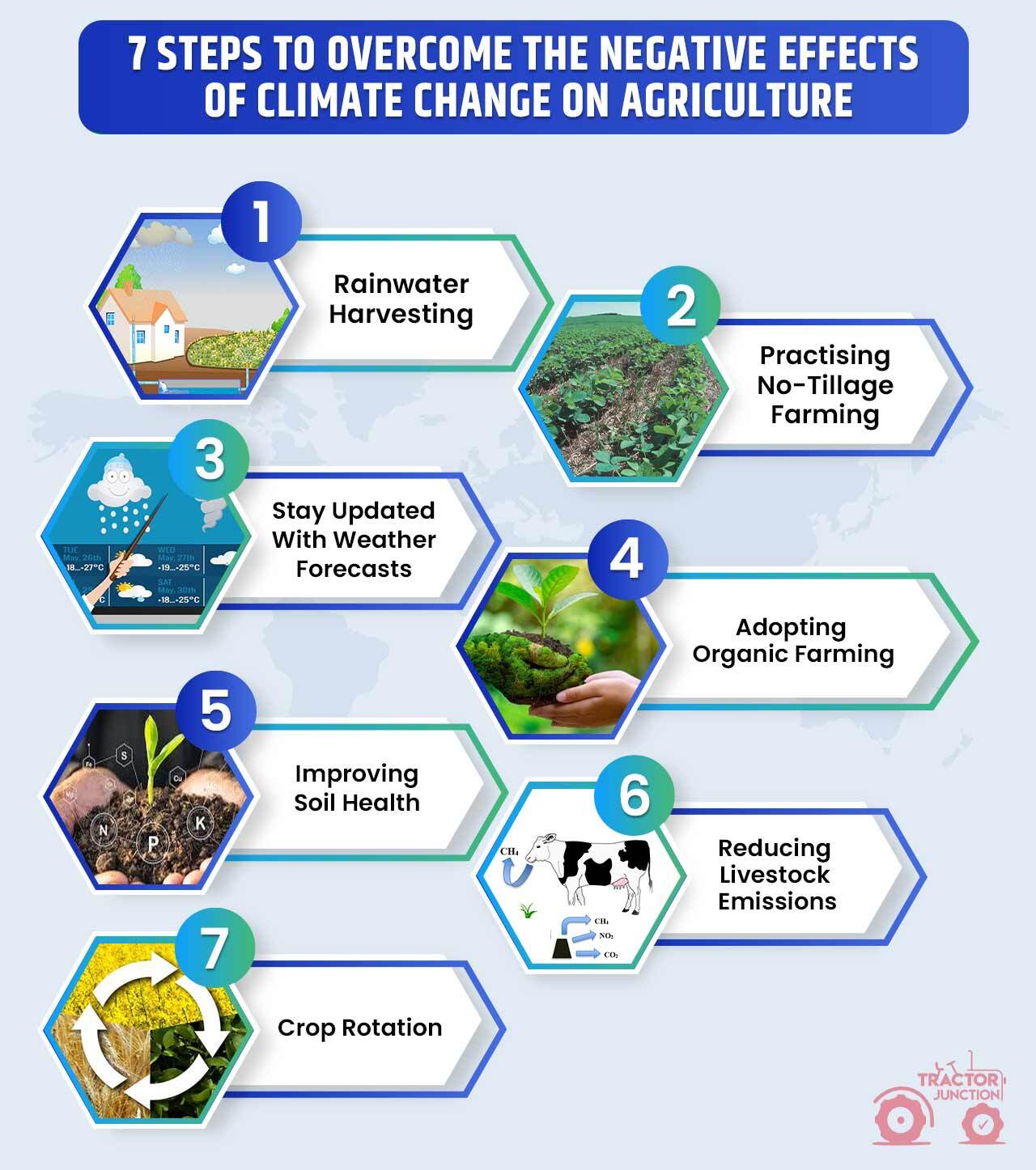
Climate change is the prolonged unnatural variation in the weather conditions and temperature due to natural or man-made factors, resulting in chaotic outcomes. According to a decade-long study, “humans emit 100 times more CO2 than all the volcanoes on the globe per year.” Thus, the resultant impact of climate change on agriculture requires urgent attention. Someday, it will indeed affect the lifestyle of future generations. And with the increasing global warming, the situation is getting worse day by day.
The reasons behind the deteriorating conditions of the planet are increasing population, greenhouse gas emissions, polluted air and many such factors. However, climate change not only affects the survival of humans but also impacts other things, such as agriculture. Variation in climate is considered one of the major reasons for less crop production, as only a good impact of climate change on agriculture is responsible for high-quality yield. And if there is less farming productivity, the entire population will suffer from world hunger and economic crisis. Therefore, it is crucial to immediately address this problem to save the human race from extinction.
5 Major Factors Responsible For Climate Change
After the wave of industrialisation in the 19th century, there was a sudden rise in pollution which led to the rise of the earth’s temperature due to unnatural factors. Although industrialisation is not the only reason for climate change, some other factors are mentioned below, which will explain how climate influences agriculture.

1. Global Warming
Greenhouse gases or GHGs play a vital role in Global warming. These gases mainly consist of Methane, Carbon dioxide, Nitrous oxide & Fluorinated gases. A study suggests that “human activities resulted in a 45 per cent increase of GHGs in the atmosphere, from 1990 to 2019.” Moreover, GHGs absorb the sun’s heat and trap it in the lower surfaces of the earth, leading to a global temperature rise. Therefore, global warming effects on agriculture are problematic as it leads to low yield.
*To know about complete details of greenhouse farming, its benefits, types and more, you can visit our blog on Greenhouse farming
2. Volcanic Eruptions
This natural activity may not seem relevant to climate change and agriculture but it can significantly degrade the planet’s environmental condition. Moreover, if we talk about volcanic eruptions they can distrubany particular area’s biological balance as they emit numerous gases and aerosol droplets into the atmosphere. Thus, leading to a negative impact of climate change on agriculture.
3. Non-Uniform Solar Activities
Our planet’s only natural light source is the sun, and this celestial body is also responsible for a generous amount of heat. Although, when there is an unfixed schedule of the sun’s natural processes, then the impact of climate change on agriculture can be unpleasant. This happens due to the improper heat distribution in the soil; which further erodes soil quality and fertility..
4. Depletion Of Non-Renewable Resources
The environment is getting adversely affected by the overuse of non-renewable resources. Besides, a large chunk of the world’s population relies on fossil fuels like coal, gas or oil, and the main reason for this reliability is the easy access to such resources. However, if we take immediate action to reduce the usage of non-renewable resources and promote renewable resources such as solar energy, we can still manage a turnaround on the impact of climate change on agriculture.
5. Variation In Earth’s Rotation & Orbiting
Decades after decades, our earth’s orbital axis and rotation are changing slightly, which is causing climate change. For example, suppose only a large part of the planet’s surface will get a lot of heat and sunshine and after a few years, if the amount of sunlight is reduced on that particular surface due to the variation in the earth’s orbit, it will surely deplete the soil’s nutrients, leading toless crop production.
Now the big question is, what can be done to increase agricultural production despite climate change? So, sit back and learn about the 7 efficient ways to improve agricultural productivity with budget-friendly solutions.
How To Overcome the Negative Impact Of Climate Change On Agriculture?

In the era of technological advancement, numerous economical methods are helping to save crops from uncertain climates. Here we are discussing 7 ideal ways to preserve crop production or stay prepared against challenging climatic conditions.
1. Rainwater Harvesting
Water scarcity is a huge problem, and irrigation in farming requires water in a significant amount. Thus, we should carefully utilise water resources as every drop of water matters. However, rainwater harvesting is promoted nowadays in case of less water availability and less rainfall.
2. Practising No-Tillage Farming
This farming technique can reduce soil erosion as tilling the soil depletes nutrients and disturbs the natural pH. Therefore, we should grow those plants that need minimum or no tillage for survival. And the outcome will explain how do crops affect the environment positively.
3. Stay Updated With Weather Forecasts
We can easily handle the threat if we already know it is about to happen. And the farmers can be readily aware of the upcoming weather through television or the internet in case of bad weather conditions. This will result in a better impact of modern agriculture on the environment and human health.
4. Adopting Organic Farming
If you are wondering which type of farming does not negatively affect the environment, organic farming is the answer. We can produce good crops and contribute to improving the environment by reducing chemical-based fertilisers and pesticides. Furthermore, we can promote the implementation of organic matter such as cow dung manure.
*For more details about environment-friendly farming, check out our Organic farming article.
5. Improving Soil Health
A nutrient-deficient soil impacts climate and agriculture as it is not helpful for any plant. Therefore, we should provide all the essential nutrients to rejuvenate the ground, resulting in a valuable asset for the plants.
6. Reducing Livestock Emissions
“The livestock industry emits more than 14.5% of greenhouse gases” and we can reduce this by providing natural supplements to the livestock and properly managing their waste and utilising it in helpful ways. Eventually it will reduce the negative impact of climate change on agriculture.
7. Crop Rotation
This is another excellent way to deal with climate change. Cultivating various crops each time helps reduce the soil infertility and replenish its nutrients. Moreover, different crops use different nutrients, so there is no lack of a particular nourishing element.
In these above ways, we can help to reduce the effect of global warming on agriculture for good quality harvest and as well improve the condition of our planet.
Stay tuned with Tractor Junction for more details.
Related Blog
Regenerative Agriculture
Floriculture in India


